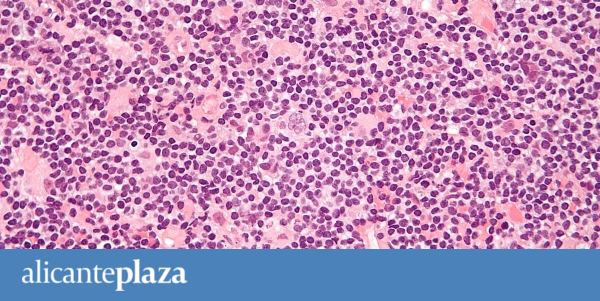According to the Spanish Association Against Cancer, Lymphoma accounts for about 4% of all cancers in Spain.
The number of new lymphoma cases in my country is 10 cases per 100,000 inhabitants, which is similar to the European average (9.8 cases per 100,000 inhabitants per year).
Slightly more common in men than women (60% of diagnoses affect males), some lymphoma subtypes (such as Hodgkin lymphoma) are considered rare due to their low incidence (2.4 new cases per 100,000 inhabitants per year), although they usually affect young people (between 16 and 40 years old)).
Diversity in lymphoma subtypes and behaviors makes prognosis difficultbecause the disease is usually not detected until late.
Nonetheless, some types of lymphoma have High survival rate after treatment If we compare them to other types of cancer.
What is Lymphoma? Where does it affect the body?
Lymphoma is a neoplastic proliferation (excessive and uncontrolled growth of tissue) affecting lymphocytesthe cells of the immune system are responsible for protecting the body from infection or tumors.
Lymphocytes are found throughout the body: although they are primarily located in the lymph nodes, lymphatic vessels, spleen and thymus, present alone in any organ.
This makes it difficult for experts to detect the source of possible changes such as abnormal growth.
“In principle, there is no conceptual or management difference between lymphoma and any other type of cancer because it involves a disorder of cell proliferation, which They tend to form tumor masses and form tumors in other parts of the body like any cancer», Quirónsalud Torrevieja and Alicante-based oncologist Dr. Joseba Rebollo explained.
“However, One characteristic of lymphoma is that it is difficult to locate its origin. This distinguishes it from other types of cancer, in which metastases retain characteristics of the original cell and its organ of origin, and can also delay diagnosis. ”
What are the reasons for its occurrence? Does it have a genetic origin?
“There are currently no known genetic genes responsible for lymphoma susceptibility,” Dr Rebolo said.
Nonetheless, some studies have shown People with first-degree relatives who have the disorder are more likely to develop it.arrive.
Other conditions that weaken the immune system and increase your risk of lymphoma include:
- Certain viral infections such as HTLV1, AIDS, Epstein-Barr, hepatitis C or chronic infections such as Helicobacter pylori.
- chronic immunodeficiency state Examples include AIDS or solid organ transplants.
- exposure to certain substances Examples include benzene and some pesticides or herbicides.
- have received chemotherapy or radiation For the treatment of previous tumors.
Are there different types of lymphoma? What are your symptoms?
basically, There are two types of lymphoma: Hodgkin lymphoma (with different manifestations) and non-Hodgkin’s lymphoma (They are a “mixture” of very diverse lymphomas, with different properties, prognoses, and treatment modalities).
“In turn, they differ from the subtype of lymphocytes from which they are derived. For example, non-Hodgkin lymphomas are divided into B-cell lymphomas (there are about 15 different subtypes of B-lymphocytes) and T-cell lymphomas (the There are another 6 different subtypes). Dr Joseba Rebollo added.
about his symptoms, andThese tumors initially appear as “Expanded Node”multiple times in automatically palpable and easily localized areas such as the neck, armpits or groin ».
Other common symptoms of lymphoma that may warrant a doctor’s consultation are Coughing or shortness of breath due to massive growth of lymph nodes inside the chest (mediastinum), fatigue, fever (not contagious), sweating (night) and lose weight.
In addition, this type of cancer can produce Other specific symptoms due to compression of adjacent anatomical structuressuch as pain in the abdomen, chest, and bones, or significant swelling of the abdomen.
Can lymphoma be cured? What treatments are used in centers such as Quirónsalud Alicante and Torrevieja?
Lymphoma covers a wide range of A range of disorders can vary in origin and behavior, making accurate diagnosis difficult.
Tests such as blood tests, lymph node and bone marrow biopsies, lumbar puncture, chest X-ray, or CT are done, in addition to other specific tests, to see if the virus has spread and through which parts of the body (PET scan, bone scan, MRI scan , abdominal ultrasound, etc.).
Dr. Rebollo added that lymphoma is a disease «High cure rate compared to other common cancerseven at an advanced stage ».
The standard method with high efficacy is chemotherapy, although it is not the only method.
In fact, the treatment of lymphoma has been an advanced treatment modality and has been applied to other tumors (proliferation or abnormal growth of cells in body tissues), which Promote cutting-edge research in the field.
“Over the decades, monoclonal antibodies have been introduced to further enhance their efficacy in combination with chemotherapy,” Commented oncologists from Alicante, Quirónsalud and Torrevieja.
“Radiation therapy has been used in some cases, and targeted drugs have been used with very high efficacy. And because there is so much researchin the treatment of lymphoma, new concepts such as immunotherapy are being incorporated biospecific antibodies or CART cells, which could be revolutionary.”

